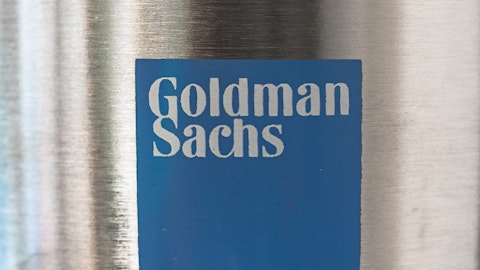In this article, we’re going to talk about the 10 cheap value stocks to invest in according to Warren Buffett.
Has Warren Buffett given up on stocks amid overstretched valuations? That’s the big question, as the “Oracle of Omaha” has been a net seller in recent months. Buffett and his top advisors, Todd Combs and Ted Weschler, have sold $166.2 billion, more stock than they have bought over the last eight reported quarters.
The selloff spree has seen Berkshire Hathaway’s cash pile swell to over $325 billion, with more than $288 billion invested in Treasuries. The adjustments come amid growing concerns that the stock market has become pricey, making it difficult to find anything of value to buy at discounted valuations.
Some of the selloffs also came amid concerns that corporate income taxes would climb with the continuation of a democrat administration. However, that is not expected to happen with Republicans controlling both houses of Congress and Donald Trump at the helm.
READ ALSO: 10 Best Blue Chip Stocks to Buy for 2025 and Billionaire Israel Englander’s Top 10 Stock Picks Heading Into 2025.
While Buffett has been a net seller in recent months, the actions point to the billionaire investor accumulating capital to pursue cheap stocks once the current correction ends. An optimist in his own right, Buffett has always insisted that even the worst recessions are only temporary and investors can find silver linings at depressed valuations.
While the stock market is still on an upswing, a fantastic buy opportunity should emerge when stock prices fall, according to the billionaire investor.
“[I]n the early 1980s, the time to buy stocks was when inflation raged and the economy was in the tank,” he explained. “In short, bad news is an investor’s best friend. It lets you buy a slice of America’s future at a marked-down price,” Buffett said.
Warren Buffett, “the Oracle of Omaha,” will go down in history as one of the most effective and successful value investors of all time. In the six decades that he has graced the ups and downs of Wall Street, his investment and holding company Berkshire Hathaway has cumulatively gained 5,500,000%. The fact that the investment firm is up by about 115% over the past five years affirms why Buffett is still a force to reckon with.
Nevertheless, the billionaire investor known for a value investing strategy that focuses on buying undervalued securities and holding them long-term appears to be slowly exiting the active investing fray. The 94-year billionaire investor has already named his middle son, Howard Buffett, his successor. Howie is tasked with steering the multibillion-dollar conglomerate Berkshire Hathaway as a non-executive chairman.
When asked why he settled on Howie, Buffett was clear: “He is getting it because he’s my son. I’m very, very, very lucky in the fact that I trust all three of my children,” he told the Wall Street Journal.
As Warren Buffett exits the stage, all eyes are on Howie to ensure Berkshire Hathaway, with over $1 trillion, continues to thrive. The holding company with one of the most diversified investment portfolios has enjoyed a compound annual growth rate of 19.8% compared to 10.2% for the S&P 500 since 1965. Diversification has proved to be a compelling investment play that has allowed Berkshire Hathaway to spread risk and, most importantly, shrug off volatility in some sectors.
While the US stock market has shown signs of exhaustion, resulting in significant pullbacks, Warren Buffett, an eternal optimist, has frequently advised against betting against America. He acknowledges that stock market corrections and US recessions are natural parts of economic cycles. Still, he believes that bull markets and periods of economic growth tend to last longer than downturns.
This belief underpins his continued bullish stance on the US stock market, even as valuations seem stretched after two years of strong rallies driven by the AI boom and a resilient economy. Despite high valuations, Buffett continues to add to positions he believes will outperform while trimming others.
Even though Buffett has been a net seller over the past two years, he has continued to bolster holdings in stocks that he believes are fairly valued. Consequently, according to Warren Buffett, the 10 cheap value stocks to invest in are those of time-tested businesses well poised to generate significant shareholders in the long run.

Our Methodology
To make the list of 10 cheap value stocks to invest in according to Warren Buffett, we scanned Berkshire Hathaway’s investment portfolio. The focus was on stocks trading with a forward price-to-earnings multiple of less than 15, as of January 10. We then settled on the top ten holdings with low P/E and examined why they stand out as value investments. Finally, we ranked the stocks in ascending order based on Berkshire Hathaway’s stake in them.
At Insider Monkey, we are obsessed with the stocks that hedge funds pile into. The reason is simple: our research has shown that we can outperform the market by imitating the top stock picks of the best hedge funds. Our quarterly newsletter’s strategy selects 14 small-cap and large-cap stocks every quarter and has returned 275% since May 2014, beating its benchmark by 150 percentage points (see more details here).
10 Cheap Value Stocks to Invest In According To Warren Buffett
10. Charter Communications, Inc. (NASDAQ:CHTR)
Forward Price to Earnings Ratio: 9.06
Berkshire Hathaway Stake Value: $914.51 Million
Number of Hedge Fund Holders: 61
Charter Communications, Inc. (NASDAQ:CHTR) is a communication services company that serves residential and commercial customers as a broadband connectivity and cable operator. After going down by about 8% in 2024, it has emerged as a dirt cheap value stock to invest in, according to Warren Buffett.
The government’s initiative to enhance broadband access to rural areas supports the company’s long-term prospects, which is expected to provide new growth opportunities. Charter Communications, Inc. (NASDAQ:CHTR) has been making significant investments in plant upgrades and rural build-outs, which are anticipated to fuel the expansion of broadband subscribers in the upcoming years. According to analysts, these investments will reach their peak in 2025. Following that, a decline in capital intensity is expected, which could result in better free cash flow generation.
Backed by a customer base of about 32 million residential and business customers across the US, Charter Communication’s broadband internet and wireless phone services are poised to receive a boost with the expansion drive. Similarly, the expansion drive should strengthen the company’s competitive edge in a market always under pressure from fibre-optic and fixed wireless access (FWA) providers.
The efforts are already bearing fruit, as the company’s service revenue increased by 37.9% in the third quarter. In addition, Charter Communications, Inc. (NASDAQ:CHTR) is gaining traction on the advertising front, and its ads revenue has grown by 17.7%. The growth affirms how the company is increasingly diversifying its revenue base as it also pursues growth opportunities in rural areas.
Weitz Large Cap Equity Fund stated the following regarding Charter Communications, Inc. (NASDAQ:CHTR) in its Q3 2024 investor letter:
“We trimmed the Fund’s positions in Meta Platforms, S&P Global, and Charter Communications, Inc. (NASDAQ:CHTR) after significant runs in the stocks. Charter posted better-than-feared quarterly results, and the stock rebounded sharply from what we viewed as deeply oversold levels. A good start, but they still have much work to do. As always, our goal with trims is to re-calibrate position sizes to better reflect the Fund’s current opportunity set.”
9. Ally Financial Inc. (NYSE:ALLY)
Forward Price to Earnings Ratio: 7.28
Berkshire Hathaway Stake Value: $1.03 Billion
Number of Hedge Fund Holders: 56
Ally Financial Inc. (NYSE:ALLY) is a digital financial services company that provides financial products and services. It is one of Warren Buffett’s top holdings for exposure in the auto financial sector as an all-digital bank focusing on customers with low fees and high saving rates. Likewise, it is a cheap value stock to invest in as it trades at a discount with a price-to-earnings multiple of 7.28.
While the stock has underperformed in recent months, it remains a top pick owing to its exposure to the auto lending business, which can be highly profitable. The fact that an average auto loan yields 10.5% leaves Ally Financial Inc. (NYSE:ALLY) in a solid position to continue generating significant interest income even with the Fed cutting the benchmark rate. Management expects to add about 80 basis points to the net interest margin as the deposit costs drop.
Ally Financial Inc. (NYSE:ALLY) may also benefit greatly as rates decline. It currently has a 4.2% deposit cost, but if the Fed continues to lower rates, that could drop considerably. Although the bank’s net interest margin is currently a healthy 3.22%, management anticipates that figure will rise to 4% or more in the medium run.
Here is what Delaware Ivy Core Equity Fund stated the following regarding Ally Financial Inc. (NYSE:ALLY) in its Q3 2024 investor letter:
“Ally Financial Inc. (NYSE:ALLY) is primarily an auto lender with solid longer-term returns. As a company dependent on funding its balance sheet (loans) through higher-cost consumer deposits, it will likely be a beneficiary of lower short-term interest rates. Ally has seen consumer delinquency rates and bad debt reserves within its auto lending portfolio increase, causing weakness in earnings and the share price, leading to an opportunity to purchase the shares amid considerable dispute.”
8. Capital One Financial Corp. (NYSE:COF)
Forward Price to Earnings Ratio: 11.49
Berkshire Hathaway Stake Value: $1.36 Billion
Number of Hedge Fund Holders: 67
Capital One Financial Corp. (NYSE:COF) is a financial services holding company that provides various financial products and services. It accepts checking accounts, money market deposits, and negotiable orders of withdrawals, savings, and time deposits. It is one of the best banking stocks after rallying by about 37% in 2024.
Due in large part to higher interest rates, Capital One Financial Corp. (NYSE:COF) delivered impressive third-quarter results depicted by a 1.6% increase in profits from credit card debt repayments. Net interest income increased by nearly 9% to about $8.1 billion as the financial institution benefited from higher interest rates. It is highly unlikely that the interest rate-cutting spree by the Fed will negatively impact net interest income. Reduced interest rates will likely give people and businesses a reason to take in more loans due to lower borrowing costs.
Additionally, Capital One Financial Corp. (NYSE:COF) is looking to expand its footprint in the financial services sector with the acquisition of Discover Financial Services (NYSE:DFS) in a $35 billion deal. The acquisition should result in the US’ biggest credit card issuer by loan volume. The deal should allow the company to pursue growth opportunities needed to generate more free cash flow to continue rewarding investors with its 1.33% dividend yield.
7. The Kroger Co. (NYSE:KR)
Forward Price to Earnings Ratio: 12.59
Berkshire Hathaway Stake Value: $2.87 Billion
Number of Hedge Fund Holders: 39
The Kroger Co. (NYSE:KR) is a food and drug retailer in the United States that operates combination food and drug stores, multi-department stores and marketplace stores. While the company has faced a challenging retail market coupled with stiff competition, it has redefined itself with a focus on online sales amid the digital revolution. Investors have shown increased confidence in Kroger’s strategic initiatives and its ability to adapt to the evolving demands of consumers, pushing it higher.
The company’s digital sales increasing by 11% in the fiscal third quarter of 2024 affirms a new avenue for growth. Delivery sales were up by 18%, driven by customer fulfilment centres. The fact that digital sales account for just 10% of total sales also underlines the massive opportunity for growth amid the digital revolution. The Kroger Co. (NYSE:KR) reported a substantial 51 basis point improvement in gross margin to 22.9% thanks to competitive pricing. Earnings per share in the quarter increased to $0.98 compared to $0.95 in the same quarter last year.
The better-than-expected earnings, characterized by robust digital sales, come from Kroger’s focus on expanding its private label offerings and enhancing digital shopping capabilities. Additionally, the retailer remains focused on enhancing customer loyalty, expanding its digital footprint, and, most importantly, engaging in competitive pricing to drive sales and strengthen profit margins. Despite worries about budgetary restraints and consumer trade-downs, The Kroger Co.’s (NYSE:KR) performance indicates that it can continue to be profitable under a range of market circumstances.
6. Citigroup Inc. (NYSE:C)
Forward Price to Earnings Ratio: 9.72
Berkshire Hathaway Stake Value: $3.46 Billion
Number of Hedge Fund Holders: 88
Citigroup Inc. (NYSE:C) is a diversified financial service holding company that provides various financial products and services to consumers, corporations, governments, and institutions worldwide. Over the past year, the bank has undertaken a restructuring drive as it seeks to reinvigorate its growth metrics and long-term prospects. As of last year, it had divested 9 of its 14 consumer franchises and is in the process of taking its Mexico consumer business public.
The restructuring drive was the catalyst behind the stock’s sentiments receiving a boost, consequently rallying by 36% last year. By focusing on its core business with the ongoing divestment, Citigroup Inc. (NYSE:C) is on course to reach the upper range of its revenue projection of between $80 billion and $81 billion. In the third quarter, the bank delivered solid financial results driven by growth in the investment banking unit and wealth management. It logged $20.32 billion in revenue against $19.84 billion expected.
Citigroup Inc. (NYSE:C) is already seeing stabilization in loan delinquencies among retail clients. Likewise, the trend is expected to improve with the slashing of interest rates following the FED cutting the benchmark rate. The company has also reiterated its commitment to return value to shareholders, having unveiled a $1 billion share repurchase program. The stock also continues to reward income-focused investors with a 3.06% dividend yield.
5. DaVita Inc. (NYSE:DVA)
Forward Price to Earnings Ratio: 13.40
Berkshire Hathaway Stake Value: $5.92 Billion
Number of Hedge Fund Holders: 39
DaVita Inc. (NYSE:DVA) is a healthcare company that provides kidney dialysis services to patients suffering from chronic kidney failure. It operates kidney dialysis centres and provides lab services in outpatient dialysis centres. It was one of the best-performing stocks in Berkshire Hathaway’s portfolio after rallying by 40% in 2024. The rally looks set to continue amid growing demand for the company’s kidney dialysis services.
As the largest kidney dialysis provider in the US, the company operates over 2,600 outpatient dialysis centers. DaVita Inc. (NYSE:DVA) also owns and operates an additional 367 centers in 11 countries. Consequently, the company boasts of a diversified and stable business model that affirms its status as a cheap value stock to invest in, according to Warren Buffett.
The company’s long-term outlook remains solid, given that the global dialysis market was valued at about $98.51 billion in 2024. Given that the market is expected to grow at a compound annual growth rate (CAGR) of 7.9% between 2024 and 2032, according to Fortune Business Insight, DaVita Inc. (NYSE:DVA) is well-positioned to benefit as the largest service provider in the sector.
4. Chubb Ltd (NYSE:CB)
Forward Price to Earnings Ratio: 10.60
Berkshire Hathaway Stake Value: $7.80 Billion
Number of Hedge Fund Holders: 51
Chubb Ltd (NYSE:CB) is a financial services company that provides insurance and reinsurance products worldwide. It stands out as one of Buffett’s top holdings owing to the company’s ability to generate more cash flow through payments for future claims. The company’s edge in the insurance sector stems from being the largest provider of property, supplemental, health, and casualty insurance policies.
As one of the biggest publicly traded property and casualty insurance companies, Chubb Ltd (NYSE:CB), is leading the way in this digital revolution as AI and big data redefine industries. The company is already benefiting from cutting-edge risk assessment models that use AI to streamline underwriting procedures and improve client experiences. In addition its been able to process enormous volumes of data at speed thanks to AI-powered analytics, therefore improving claims management
Its large-scale operations have been the catalyst behind revenue growing at a compound annual growth rate (CAGR) of 7% since 2016, with earnings per share increasing at a CAGR of 14%. The fact that Chubb Ltd (NYSE:CB) maintained steady growth even as the pandemic caused havoc followed by geopolitical tensions and heightened inflations underlines the resilience of its core business.
3. The Kraft Heinz Company (NASDAQ:KHC)
Forward Price to Earnings Ratio: 9.15
Berkshire Hathaway Stake Value: $11.43 Billion
Number of Hedge Fund Holders: 38
The Kraft Heinz Company (NASDAQ:KHC) is a packaged foods company that manufactures and markets food and beverage products. Its products include condiments and sauces, cheese and dairy products. While the stock was down by about 24% in 2024, its fortunes have received a significant increase in the aftermath of the Fed cutting interest rates. The cuts positively impact consumer purchasing power by reducing borrowing costs.
The Kraft Heinz Company (NASDAQ:KHC) is well-known for its wide range of well-known food and drink brands, which include Philadelphia, Heinz, Kraft, and Jell-O, among many others. The company has a devoted global customer base thanks to its reputation for producing high-quality food products. Wall Street predicts Kraft Heinz will return to its previous level of profitability with steady, low-single-digit growth. The growth would be fueled by strong consumer spending demand amid a resilient US economy.
The company currently stands out as a cheap value stock to invest in owing to its 5.39% dividend yield, which is above the industry average of 4%.
Mairs & Power also highlighted efforts made by The Kraft Heinz Company (NASDAQ:KHC) in its Q3 2024 investor letter. Here is what the firm has to say:
“We added The Kraft Heinz Company (NASDAQ:KHC) to the Fund in the quarter. Kraft Heinz is a leading global food company which possesses a portfolio of iconic brands, including its eponymous ketchup brand. The company has been undergoing an operational transformation focused on driving efficiency gains in supply chain, manufacturing and distribution. These efficiency gains have fueled increased investments in technology, automation, innovation and marketing, which should ultimately drive more consistent organic revenue growth and high single digit earnings per share growth. We expect above-average long-term returns, buoyed by consistent free cash flow generation, opportunistic share repurchases and an attractive 4-5% dividend yield. A modest current valuation affords an ample margin of safety.”
2. Chevron Corporation (NYSE:CVX)
Forward Price to Earnings Ratio: 12.72
Berkshire Hathaway Stake Value: $17.47 Billion
Number of Hedge Fund Holders: 63
Chevron Corporation (NYSE:CVX) is an integrated energy company that explores, develops, produces and transports crude oil and natural gas. It is one of the stocks well poised to benefit from friendly policies from Donald Trump’s administration.
Chevron’s edge as one of the best-value stocks stems from its diversified energy business. The company maintains operations upstream, which entails energy production; midstream, which involves operating pipelines; and downstream, which is essentially a chemicals and refining business. Given that fees drive the midstream business, Chevron Corporation (NYSE:CVX) has a reliable source of revenue on its exposure regardless of prevailing economic conditions. Its downstream business also shields it from low oil prices.
While oil prices will always be a key determinant of the company’s performance, the midstream and downstream business units help offset the peaks and valleys in the energy sector due to oil price fluctuations. Owing to the diversified nature of the core business, Chevron Corporation (NYSE:CVX) has succeeded in generating free cash flow, consequently reducing its debt from $45 billion to about 25 billion. Likewise, it has returned shareholder value with its 4.34% dividend yield.
Here is what TCW Relative Value Large Cap Fund said about Chevron Corporation (NYSE:CVX) in its Q3 2024 investor letter:
“Chevron Corporation (NYSE:CVX), headquartered in San Ramon, CA, is an integrated energy company. At elimination, the stock had a $273 billion market capitalization and met all five valuation factors, including a robust 4.4% dividend yield. Chevron’s planned acquisition of Hess† would yield a strong restructuring catalyst through elimination of duplicate corporate costs and a new markets catalyst through Hess’ 30% interest in the Stabroek oilfield off Guyana; these blocks have a very low cost of supply and decades of reserves that would support strong free cash flow. While Chevron recently received Hart[1]Scott-Rodino (HSR) clearance to acquire the company, the closure timing has extended from Q4 2024 to possibly to Q2 2025 as Chevron is engaged in arbitration with peers ExxonMobil (XOM; 2.47%**) and Chinese state-owned CNOON over rights of first refusal (ROFR) for Hess’ interest in Stabroek. As Chevron’s expected arbitration resolution timeline has slipped, we believe that ExxonMobil and CNOOC’s ROFR case may have more merit than expected, thus putting the entire Hess acquisition at risk. Given an increasingly reasonable outcome that Chevron might abandon the Hess acquisition altogether, we eliminated the position in the stock.”
1. Bank Of America Corporation (NYSE:BAC)
Forward Price to Earnings Ratio: 12.20
Berkshire Hathaway Stake Value: $31.65 Billion
Number of Hedge Fund Holders: 98
Bank Of America Corporation (NYSE:BAC) is a financial services giant that provides banking, financial products and services to individual customers and institutional investors. It is a highly regarded investment play in the financial service sector owing to its monster scale and brand reach through branches and corporate offices. The stock was up by about 37% in 2024 as investors reacted to strong corporate results that allowed it to return significant value to shareholders.
One aspect of Bank Of America Corporation (NYSE:BAC) that may be taken for granted is its steady profit growth. Its net profit margin has averaged 25% over the last ten years. The company’s profitability enables it to pay dividends on a consistent basis. Consequently, it is a cheap value stock to invest in, according to Warren Buffett, as it trades at a price-to-earnings ratio of 12.48 while rewarding investors with a 2.25% dividend yield.
While we acknowledge the potential of BAC as an investment, our conviction lies in the belief that AI stocks hold greater promise for delivering higher returns, and doing so within a shorter timeframe. If you are looking for an AI stock that is more promising than BAC but that trades at less than 5 times its earnings, check out our report about the cheapest AI stock.
READ NEXT: 8 Best Wide Moat Stocks to Buy Now and 30 Most Important AI Stocks According to BlackRock.
Disclosure: None. Insider Monkey focuses on uncovering the best investment ideas of hedge funds and insiders. Please subscribe to our free daily e-newsletter to get the latest investment ideas from hedge funds’ investor letters by entering your email address below.





